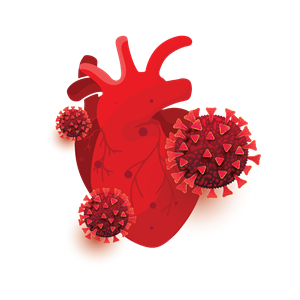 People who have certain cardiac conditions, like coronary artery
People who have certain cardiac conditions, like coronary artery disease, cardiomyopathy and congestive heart failure, are at a significantly higher risk for complications from COVID-19.
disease, cardiomyopathy and congestive heart failure, are at a significantly higher risk for complications from COVID-19.
Many of these patients also have other conditions that contribute to potential complications, like obesity, hypertension, diabetes, tobacco use, and lung disease. As we enter year two of the COVID-19 pandemic, however, it’s becoming increasingly clear that the virus can have long-lasting effects on the heart—even in otherwise healthy people. Dr. Ido Preis, cardiologist at CMC’s New England Heart & Vascular Institute and director of the Sports Cardiology Clinic, offers insight on what doctors are looking for in patients who have recovered from COVID-19.
We know that COVID-19 can affect the heart in a multitude of ways. Sometimes, the effects on the heart are obvious, as patients develop heart failure, heart attacks and arrhythmias, all of which can have long term effects. Other times the effects of the infection itself make the heart work harder. This can become a problem especially if the patient’s heart was not completely healthy to begin with. We also know that in some cases COVID-19 increases the body’s tendency to form blood clots, which can lead to clotting of arteries or stroke.
Patients have reported a range of long-term symptoms from COVID-19 including palpitations, fatigue, shortness of breath, chest pain, or erratic heart rates. I have even seen this in very healthy, young, athletic patients. These lingering symptoms from COVID-19 are still somewhat of a mystery, leading some to describe this as a “long haul” illness. Patients should talk with their doctor if they continue to or begin to experience these symptoms about two to three weeks after recovering from COVID-19. An evaluation or testing may be needed. In some patients we see clear cardiac dysfunction, in others however, the effects can be more subtle and require more advanced cardiac testing like MRI scanning to diagnose. It can also be difficult to weed out what is causing these symptoms: heart injury, lung injury, or general deconditioning.
In the most severe instances, the virus can directly invade the heart, which can lead to the body’s immune system provoking an inflammatory response that damages the heart muscle. This is known as myocarditis. Myocarditis can happen even in healthy, young, athletic patients. At our Sports Cardiology Clinic, one of our concerns is that acute myocarditis in athletes can even lead to heart rhythm disorders. In some cases, the condition can lead to sudden death.
It’s unclear how long or permanent these effects are. This is a new topic and research is still ongoing. Some treatments are available that focus on symptom relief. Generally, we tend to see improvement over time, and anticipate most patients will fully recover. We will be studying this for a long time to come.